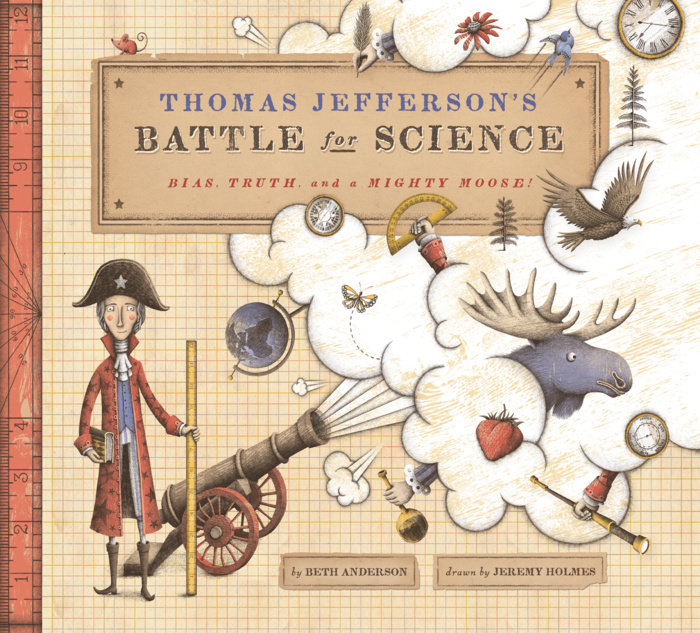
A Kirkus Best Picture Book of the Year
2025 Texas Topaz List
Thomas Jefferson is one of the most famous founding fathers, but did you know that his mind was always on science? This STEM/STEAM picture book tells how Jefferson’s scientific thinking and method battled against faulty facts and bias to prove that his new nation was just as good as any in the Old World.
★ Booklist, starred review
★ The Horn Book, starred review
★ Kirkus Reviews, starred review
★ School Library Journal, starred review
Young Thomas Jefferson loved to measure the natural world: plants and animals, mountains and streams, crops and weather. With a notepad in his pocket, he constantly examined, experimented, and explored. He dreamed of making great discoveries like the well-known scientific author, Count Georges-Louis Leclerc de Buffon.
But when Buffon published an encyclopedia of the natural world, Jefferson was furious! According to the French count, America was cold and swampy, and filled with small and boring animals, nothing like the majestic creatures of the OId World. Jefferson knew Buffon had never even been to America. Where had Buffon gotten his information? Had he cherry-picked the facts to suit his arguments? Was he biased in favor of Europe?
How could Jefferson prove Buffon wrong? By using scientific inquiry, of course! This first picture book to emphasize Jefferson’s use of scientific methods is an accessible and entertaining approach to a lesser-known side of Jefferson.
A great read for President's Day!
Book Details
A Kirkus Best Picture Book of the Year
★ “With theatrical flair, Anderson and Holmes lay out a historical contretemps between Jefferson, who took 'supreme delight' in science and was an eager observer of the natural world, and renowned French naturalist Buffon over his unsupported claim that, with the mammoth extinct, the New World’s wild creatures were uniformly smaller and weaker than those of the Old. The illustrator underscores the narrative’s droll, punchy tone by pinning cartoon figures in period dress, images of wildlife, leaf, and bone specimens with handwritten labels, and sheets and scraps with quotes on ruled or raw wooden backgrounds for an untidy scrapbook effect... readers will come away knowing more about the multifaceted character of the man who, a few years later, sent out the Lewis and Clark Expedition and, oh yes, became our second president.”—Booklist, starred review
★ “As a product of the Age of Reason, Thomas Jefferson was long fascinated by science in general and the natural world in particular... In other words, he followed the scientific method, nicely summarized in the back matter. The mixed-media illustrations, crafted with woodblocks and pencil, are highlighted in unusual but effective layouts. The written narrative appears in textboxes, acting either as previews for the often-humorous illustrations...or as comic panels.” —The Horn Book, starred review
★ “A delightfully enlightening account and a welcome antidote to our own time’s precarious truthiness.”—Kirkus Reviews, starred review
★ “This enlightening account of a president and his study of the natural world is a needed addition to the elementary library.”—School Library Journal, starred review

